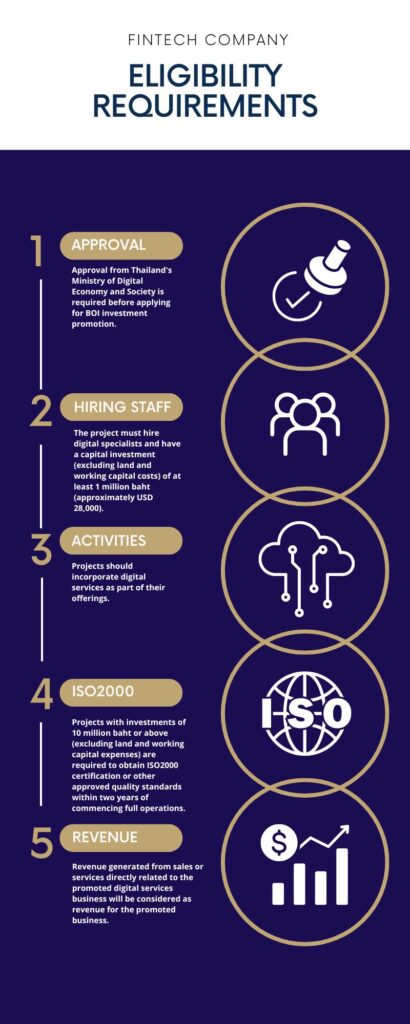Introduction:
The global business landscape has undergone a significant transformation driven by the rapid advancements in financial technology (fintech). This development has changed the way businesses operate worldwide, with Southeast Asia emerging as a leader in fintech innovations. Thailand has solidified its position as a strategic hub for fintech expansion, offering a growing digital marketplace supported by well-designed regulatory frameworks and government incentives.
Thailand’s fintech ecosystem presents an attractive opportunity for foreign investors. The country’s tech-savvy talent pool, coupled with its supportive government, creates an environment that is highly developed to support fintech growth. While Thailand has a couple of suitable options available, incorporating fintech companies in Thailand through Thailand’s Board of Investment (BOI) should be the first consideration for interested investors.
Key Points
- Thailand has become a popular hub for fintech expansion, offering a developed digital marketplace supported by favourable regulatory frameworks and government incentives.
- Obtaining a promotion from Thailand’s Board of Investment (BOI) presents significant advantages, including tax incentives such as corporate income tax exemptions, 100% foreign ownership permissions, streamlined work permits and visas and land ownership rights.
- The BOI offers promotion schemes for various tech sectors, including software industries.
- Promoted business categories within the fintech sector include digital payments/e-wallets, peer-to-peer (P2P) lending platforms, blockchain technology, and insurtech.
- To qualify for BOI promotion in the digital services category, fintech companies need approval from Thailand’s Ministry of Digital Economy and Society, meet capital investment and digital specialist hiring requirements, incorporate digital services, obtain relevant certifications, and generate revenue from promoted digital services.
Current Fintech Landscape in Thailand
Thailand’s fintech sector has experienced remarkable growth in recent years, supported by a combination of favourable government policies, a tech-savvy population, and a thriving startup ecosystem. Currently ranking fifth in fintech funding among Southeast Asian countries, Thailand is looking to strengthen its digital monetary systems, with assistance from both commercial banks and the central bank.
Over the past three years, Thailand has experienced an increase in digital financial transactions, with e-wallets and mobile payment platforms gaining widespread popularity. Peer-to-peer (P2P) lending networks have also emerged as a credible alternative to conventional bank loans, simplifying credit accessibility.
The Thai government’s proactive support, through funding opportunities, mentorship initiatives, and startup incubation programs, has further pushed the sector’s expansion and achievements. The Thailand 4.0 initiative aims to encourage the nation’s financial infrastructure and nurture the growth of fintech enterprises, offering a range of measures and incentives to attract investments and promote innovation.
The central bank is working to develop its infrastructure to support the developments in electronic banking and fintech, for example the adoption of the ISO 20022 financial transaction reporting standard, which simplifies e-invoicing, e-factoring, and allows businesses to effectively use their customers’ financial transaction data.
Furthermore, the Bank of Thailand has released the Consultation Paper on Virtual Bank Licensing Framework, which introduces virtual banks as new financial service providers. This move highlights the country’s commitment to promoting financial innovation and technological advancements in the fintech sector.
With regards to the current status regarding virtual banks in Thailand, The Bank of Thailand currently plans to award three virtual banking licences by the middle of 2025. The winning entities will be required to start operating by mid-2026.
There are currently five applicants bidding for the licences, including:
- Lighthub Asset’s partnership with WeLab.
- Krungthai (in partnership with Advanced Info Service and PTT Oil and Retail Business (OR));
- SCB X’s partnership with South Korea’s KakaoBank and China-based WeBank;
- Bangkok Bank, VGI, Sea Group, Sahapat Group and Thailand Post;
- Ascend Money (owned by Ant Group and CP Group) in partnership with Ant Group; and
Benefits of the BOI for Fintech Companies in Thailand
Obtaining a promotion from the BOI presents many advantages that make it an attractive choice for multinational fintech companies seeking to enter the Thai market. These benefits include both tax incentives and general business operating incentives.
BOI Tax Incentives
One of the most significant advantages of obtaining a BOI promotion is the tax incentives on offer. BOI-certified fintech companies can benefit from tax exemptions or reductions for up to eight years, depending on the level of investment and the nature of their business activities.
The relevant tax incentives include:
- Exemption from corporate income taxes for a period ranging from three to eight years
- Exemption from taxes on dividends originating from promoted projects during the corporate income tax holiday
- Permission to carry forward losses as deductible expenses for up to five years
It is important to note that the specifics of BOI tax incentives can vary based on the particular product or service associated with the promoted project.
BOI General Business Incentives
In addition to the attractive tax incentives, the BOI certification offers several general business incentives that further enhance the appeal for fintech companies:
100% Foreign Ownership
While regular Thai Limited companies are typically limited to 49.9% foreign ownership due to the Foreign Business Act, BOI-promoted companies face no such restriction, allowing complete foreign ownership.
Foreign Business Certificate
BOI-promoted firms receive a Foreign Business Certificate, exempting them from the 50+ restricted business categories under the Foreign Business Act. This opens up opportunities for a wider range of business activities in Thailand.
No Employee Quotas
Unlike other structures, BOI-promoted companies face no quotas when hiring foreign skilled employees. For example, Thai Limited Companies typically need a 4:1 ratio of Thai to foreign employees, but this requirement doesn’t apply to BOI-promoted businesses. Additionally, the process of obtaining visas for foreign employees is significantly more straightforward with BOI approval.
Facilitation of Work Permit and Visa Applications for Foreign Employees
Foreign employees can apply for and obtain their visas and work permits at the One Stop Service Center in Bangkok. This greatly speeds up the entire process as applicants can pick up their work permit and visa in a couple of hours.
Eligible Fintech Business Activities for a BOI Promotion
The BOI offers promotion schemes for various tech sectors falling under Category 5 of BOI-promoted activities. Some of the popular tech industries within this category include:
Software Industries
This category includes two distinct types of software industries eligible for BOI promotion:
- Embedded or High Value-Added Software
- Enterprise Software and/or Digital Content
Digital Services (including Fintech)
Digital services includes a wide range of activites, including software platforms, managed services, digital architecture design, and various industry-specific fintech services like insurtech, regtech, medtech, agritech, and more.
Examples of Promoted Business Categories within the Fintech Sector
The BOI actively supports investments in specific segments of the fintech sector, recognizing their significant importance and their potential to encourage economic growth in the country. Some of the promoted business categories within the fintech sector include:
Digital Payments and E-Wallets
The BOI’s framework provides incentives to companies that specialize in delivering reliable and convenient digital payment solutions.
Peer-to-Peer (P2P) Lending Platforms
The BOI provides backing to fintech companies involved in facilitating peer-to-peer lending projects.
Blockchain Technology
The BOI actively promotes the integration of blockchain technology within the fintech environment. It promotes companies using blockchain for a wide variety of applications, such as supply chain management, smart contracts, and identity verification.
Insurtech
The BOI recognizes the potential of technology within the insurance sector and encourages investments in insurtech startups.
Eligibility Requirements for a BOI Promotion for Fintech Companies
To qualify for BOI promotion in the digital services category, certain conditions must be met:

Our Thoughts
Thailand is an increasingly attractive destination for fintech companies, thanks to a supportive regulatory environment, proactive government initiatives, and strong digital adoption rates. The Bank of Thailand (BoT) has established regulatory sandboxes and is exploring open banking standards, creating a safe space for fintech innovation. The Board of Investment (BOI) also offers substantial incentives, including tax exemptions and visa support for foreign talent, which makes market entry and operations easier for fintech firms. The “Digital Thailand” initiative aligns government support with digital transformation, emphasizing fintech as a key area of economic growth.
Thailand also has a highly engaged consumer base for digital finance, with high smartphone usage and widespread use of mobile payments like PromptPay and TrueMoney. Thailand ranks among the world’s top adopters of cryptocurrency, supported by clear regulations from the Securities and Exchange Commission (SEC) for digital assets and exchanges.



